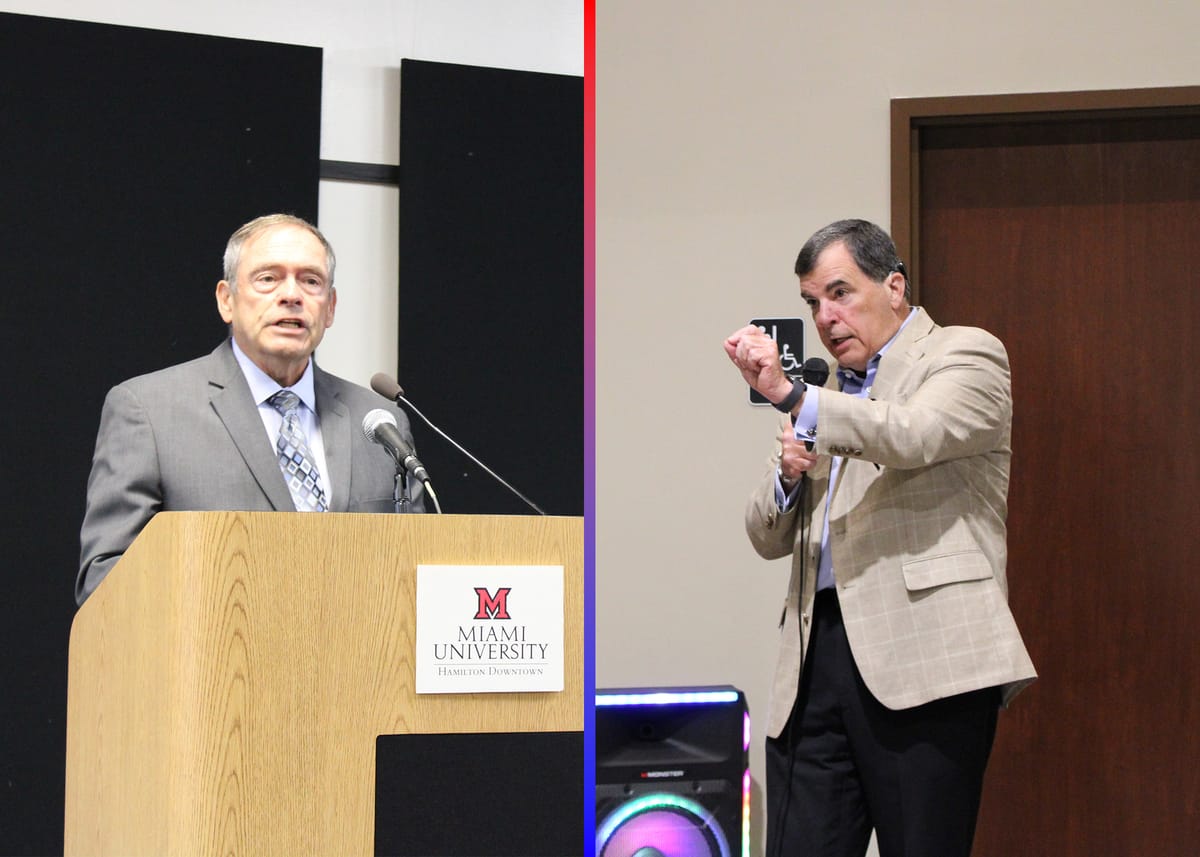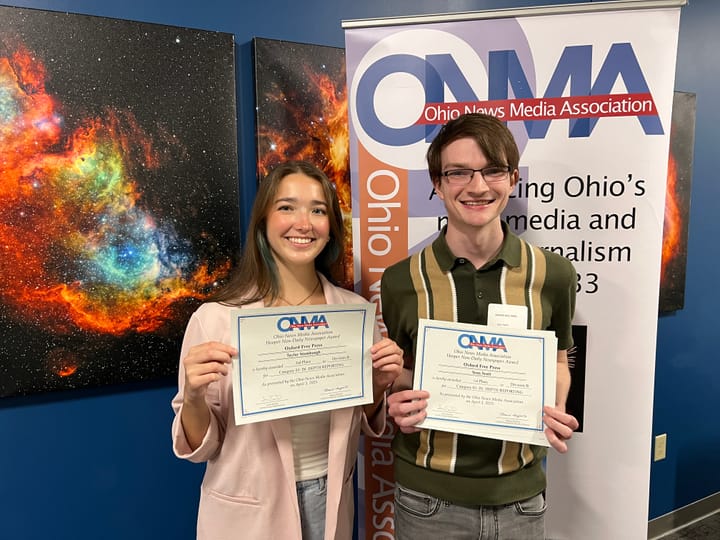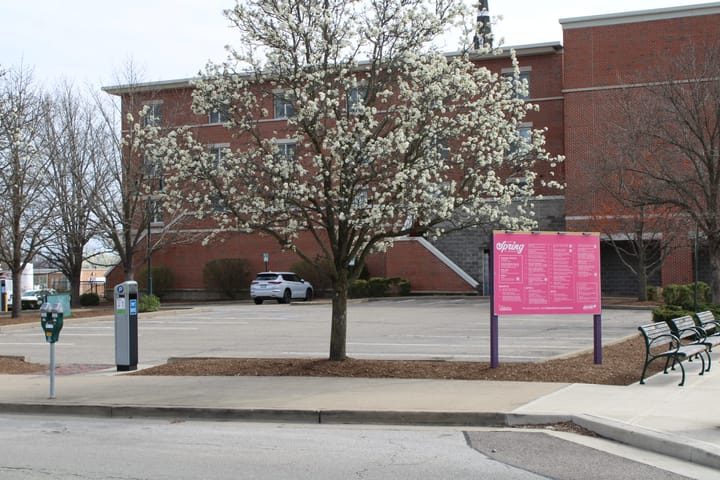Oxford resident faces incumbent in state senate race
George Lang, an Ohio State Senator who represents most of Butler County, is running to keep his seat against Democratic challenger Tom Cooke.

Ohio State Senator George Lang, a Republican from West Chester is facing a challenge to retain his seat this year. Tom Cooke, an Oxford resident who moved to the area in 2021, is running as a Democrat in a bid to unseat Lang in the 4th Senate District.
Lang was elected in 2020 under a different senate map. That year, Lang’s district covered all of Butler County except for Monroe. This year’s newly drawn senate maps have the 4th district covering all of Butler County except for Milford and Wayne Townships and Trenton.
Tom Cooke
Party: Democrat
Campaign Website: www.tomcookeforohio.com
Cooke first moved to Ohio in 2021 after a decades-long career in intelligence. He was born on Long Island and joined the Army after graduating high school. After college, he went on to serve in several intelligence roles during a 20-year career with the military. Then, in 2000, he moved to Virginia to work as a senior staff officer at the National Geospatial-Intelligence Agency.
Having a background in intelligence has helped Cooke to analyze complex situations, he said, a skill he would bring to the position of state senator if elected.
One of the first things Cooke did after moving to Oxford was sign up to teach a class at Miami University’s Institute for Learning in Retirement, and he’s also become a board member of the Oxford Kiwanis Club. Cooke said he doesn’t see his recent move to the community as a barrier to his election.
“I chose to live here,” Cooke said. “I made a conscious decision to make Oxford and Ohio and Butler County my adopted home … The community has been very welcoming, and I’ve been very happy to support them.”
If elected, Cooke said his top priorities would include funding public education, protecting reproductive rights and healthcare access, and reforming Ohio’s gun laws.
Lang is president of Second Call Defense, a membership organization which describes itself as “first membership organization in America to offer immediate, comprehensive, nationwide, 24-hour support for all weapon owners who are forced to defend themselves or their family with a legal weapon.” Cooke has described Lang as profiting when Ohioans shoot each other and said Second Call Defense provides liability insurance for gun owners. According to the organization’s website, however, it “does not sell or promote insurance products.”
One of Cooke’s primary goals with gun legislation is to repeal House Bill 99, which allows teachers to carry guns in school after 24 hours of training. Cooke said the state should focus on providing districts with resources to hire first responders rather than counting on school staff to use deadly force in emergencies.
“If you feel that your school needs an armed presence, then you need to ensure that you provide a trained armed presence, which is a [school resource officer], not arming a teacher,” Cooke said.
Ohio currently provides scholarships of more than $6,000 for students from public schools to attend participating private schools under its EdChoice program. Cooke said he wants to see taxpayer money going toward public schools which serve entire communities instead.
According to reporting in the Dayton Daily News, Ohio awarded nearly $1 billion for families to send kids to private schools during the 2023-24 school year.
While Cooke didn’t describe economic development as a priority, he said ensuring that the state has strong public schools, broad healthcare access and broad reproductive rights for women are essential to boost the state’s economy.
“I don’t have any problem with business development,” Cooke said, “but you need to make the community favorable for people to want to live here, to work in those businesses.”
Cooke also supported increasing access to medical resources like narcan to address public health issues facing Ohio, particularly the opioid crisis. He also said the state needs to increase access to counseling.
George Lang
Party: Republican
Campaign Website: www.georgelang.com
Lang, a West Chester resident, was first elected as a state senator in 2020. He previously served on the West Chester Board of Zoning Appeals and was elected as a township trustee in 2003, where he served until being appointed to the Ohio House of Representatives in 2017 following Margaret Conditt’s resignation.
Lang owns five businesses, four of which are based in Butler County, and is married to his high school sweetheart, Debbie. Lang said he works six days a week, splitting his time evenly between his businesses and his work as a state senator.
Because of his involvement with Second Call Defense, Lang said he avoids taking part in any legislative discussions or votes related to gun laws.
As an elected official, Lang said his primary focus has been economic development.
“Our citizens can’t flourish if our businesses don’t prosper,” Lang said. “My goal is to make Ohio the most business-friendly state in the nation. I happen to believe Ohio is better positioned than any other state in the nation for future growth if we can get the business climate right.”
In the past five years, Lang said Ohio has seen 960,000 startups in the state. West Chester in particular has grown from 500 businesses in 2003 to more than 4,000 now, a growth which Lang attributes in part to his policies.
If reelected, Lang said his top three priorities during his next term will be to eliminate the state income tax, continue to deregulate business and reduce the cost and complexity of state government.
Lang said that when states lower taxes, revenue increases. According to the Federal Reserve, Ohio’s state tax collection has increased annually since 2017. Ohio Policy Matters, a nonprofit policy research institute, opposes the elimination of Ohio’s personal income tax, arguing that the move would disproportionately benefit wealthy Ohioans and lead to a yearly deficit of $11 billion.
The 4th Senate District and particularly Hamilton have had a renaissance in the past decade, Lang said. He attributes that success to the county having some of the lowest taxes on income, sales and property throughout the state, despite a recent increase in property taxes.
“Butler County has flourished from prosperity,” Lang said. “We don’t have the benefit of being a Columbus where government is, where businesses want to go just to be close to the state capital. Butler COunty has done it just by being business-friendly.”
To reduce the cost and complexity of state government, Lang advocated for reducing the number of state parks from 75 to 50. Lang also said he supports using natural gas to provide “cheap, clean, reliable energy” for businesses moving to Ohio but added that the state should invest in all types of energy including wind, nuclear, coal and solar.
As a Republican, Lang said he often disagrees and “fights like hell” on policy issues with Democrats in the state senate. Despite that, he said he considers them friends and has been out to dinner with all but one of them.
“We can fight over policy and still be friends,” Lang said. “Unfortunately, for the most part, that is something that is dead in Washington, D.C.”
State Senators serve for four-year terms and are limited to two successive terms, unless those terms are separated by four or more years. Early voting began in Ohio on Oct. 8 and will continue through election day on Nov. 5.




